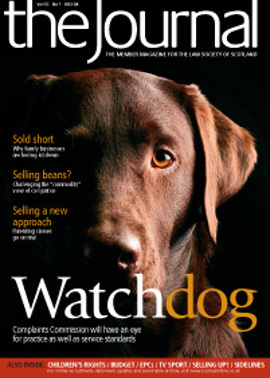Whose star will shine?

Supporting organisations which are constantly changing and evolving gives the in-house lawyer tremendously interesting and varied work. It brings its own challenges, above all to communicate practical advice.
Working effectively within an organisation needs strong skills in communication, commerciality, the ability to put advice in a business context, and an awareness of risk, proportionality and business imperatives, as well as an understanding of the law.
As lawyers, we sometimes don’t place enough emphasis on these wider skills, which our clients consistently tell us are important to them – and they measure us by our ability, or otherwise, to deliver them.
This is where The Signet Accreditation comes in. This is the new programme to assess and accredit lawyers which has been set up by the WS Society. This innovative programme places as much emphasis on client-focused skills as on technical legal skills. In keeping with its fresh approach, The Signet Accreditation is recognising the in-house role as a practice area in its own right, and the important part that in-house lawyers play in their organisations. The first assessments will take place later this year.
This should be music to an in-house lawyer’s ears. The skills recognised by The Signet Accreditation are precisely those which can make a difference to an organisation, and should be the areas in which lawyers pride themselves.
New recognition
It is easy to lose sight of these objectives with an increasing workload, especially in a time of economic uncertainty when the pressure to meet budget can become overwhelming. The WS Society’s scheme is a timely reminder that these are just the areas where we should be devoting more time and energy if we are to be effective and valued by our internal clients.
This challenge is not unique to in-house lawyers. There is a growing recognition amongst private practice lawyers that to be truly effective there is a need to understand the client’s perspective and be able to deliver advice in a way that is most effective for the client. The scheme is now attracting international attention as similar challenges are faced by our colleagues in other parts of the UK and further afield.
As Lord Cullen of Whitekirk, the former Lord President, who chairs the accreditation board, says: “The launch of The Signet Accreditation coincides with a wider recognition of the need for more focus on ongoing professional development and assessment of lawyers’ skills, particularly in practical application.”
One of the reasons for setting up the scheme was an acknowledgment that there was a need for a mid-career point that would recognise a lawyer’s expertise gained since qualification. Further, one of the aims in providing an independent award is to revolutionise the way lawyers are recognised, both within the profession and by clients, internal or external. And we all know that recognition within organisations is hard enough to come by for in-house lawyers.
The scheme offers lawyers the opportunity of recognition from an independent and highly respected source. It is open to all Scottish lawyers, with no minimum or maximum PQ requirement; however lawyers will typically apply for assessment at three to six years’ PQE, having allowed time to develop these client focused skills.
Just like real life
The real innovation of the assessment process embodied by The Signet Accreditation is to ask candidates to reproduce the skills they use when working on a normal file. Each assessment is based on a realistic scenario drafted by a practice area committee (PAC), consisting of a group of lawyers experienced in the area of practice. For the in-house sector, this means in-house lawyers drawn from both the public and private sectors. It is a testament to the desire of the in-house community to increase the focus on skills important to clients that so many experienced in-house lawyers have come forward to sit on the PAC.
The assessment usually starts with a client meeting, followed by initial written advice. Part 2 continues the scenario and asks for more in-depth drafting. Part 3 finishes with a written examination consisting of questions that might be asked by a client. For example, questions will be along the lines of “Brian Jones called. Can you email him quick advice on…”, rather than “explain the effect of section xx of a particular Act”. This is a very different form of assessment from the typical exam process that we are all familiar with from an academic context.
Just as in the office, all parts of the assessment are open book, reinforcing the fact that this assessment is about how you operate in practice, not about how much you have read in a book.
The PAC is also responsible for marking the assessment. At each stage they are looking for lawyers to respond just as they would in practice, with practical advice communicated in a way that is meaningful to the client.
Practical guidance
Feedback from last year’s candidates has led to updated guidance being available to lawyers, explaining what is expected of them in the assessment and how to prepare. This guidance is reassuringly practical. It is not about reading lists and studying intensively for four weeks and then you’ll pass. The scheme doesn’t work like that. Lawyers are encouraged to look on the assessment as if they were about to be assigned another piece of work – you wouldn’t think about going to study: you would just get on with it.
I would encourage all in-house lawyers to think about coming forward for assessment. If you are already working on a range of files with the minimum of supervision, confidently and effectively, then you should be able to come forward with confidence. For managers, The Signet Accreditation provides a tangible way of demonstrating your confidence in your rising stars by encouraging them to do so.
Helen Bowman is Director, Legal Support Services at the WS Society
Applications are now open for the 2008 assessment period, which runs from
22 September to 3 October. To find out more about the assessment or to apply, please go to www.thesignetaccreditation.co.uk or contact Helen Bowman at The WS Society (t: 0131 225 0654 e: hbowman@wssociety.co.uk).In this issue
- No place for secrecy
- Getting a Get in Scotland - 2
- Crunch time
- Home reports: oh no they won't
- Recoverable proceeds
- Justice diverted
- On the scent
- Learning to live together
- Learning to live apart
- ARTL: one lender's view
- Games without frontiers
- Games without frontiers (1)
- Speaking up for children
- Poor relations?
- Justice for sale?
- Shining light into the darkness
- Legal aid review gets down to work
- CPD for new lawyers
- Professional Practice Committee
- Time to sell up?
- Beyond chip and PIN
- Lender claims
- The price of justice
- Transition tales
- Falling between stools
- The Environment v X
- More equal than others?
- Points to prove
- Website reviews
- Book reviews
- Whose star will shine?
- Taken for granted
- An A to G of EPCs






